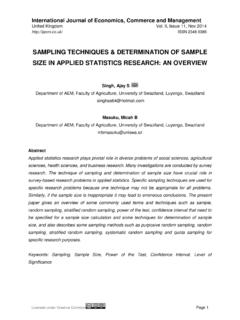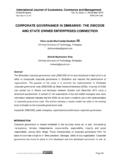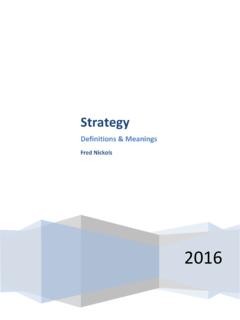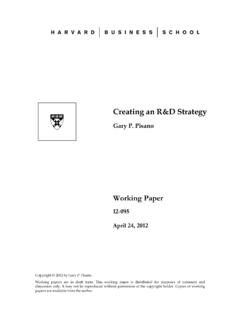Transcription of CONCEPT OF REWARD MANAGEMENT, REWARD SYSTEM …
1 International Journal of Economics, Commerce and management United Kingdom Vol. VI, Issue 2, February 2018 Licensed under Creative Common Page 621 ISSN 2348 0386 CONCEPT OF REWARD management , REWARD SYSTEM AND CORPORATE EFFICIENCY Joycelyn Samatha Anku Department of Marketing, Faculty of Business and management Studies, Ho Technical University, Ho, Ghana Bless Kojo Amewugah Department of Marketing, Faculty of Business and management Studies, Ho Technical University, Ho, Ghana Mawutor K. Glover Department of Agro Enterprise Development, Faculty of Applied Sciences, Ho Technical University, Ho, Ghana Abstract Employees who make up a company remain the organization s unique and biggest asset - whilst they provide performance, organizations aim to REWARD them in an equitable manner - fairly, unbiased and consistently in accordance with the value they create in the organization.
2 REWARD SYSTEM exists with a specific end goal to motivate employees to work towards accomplishing vital objectives which are set by entities. This study clarified the phenomenon of REWARD systems and corporate efficiency. It additionally reviewed other research findings in the range of REWARD systems. It assessed emerging and critical issues that inform REWARD decision-making. It again raised issues for example, the issue of measuring comparability and the concern of recognition programmes. This study concludes that the REWARD SYSTEM plays an essential role in motivating workers to perform innovatively. Keywords: Corporate Efficiency, Motivation, Organisation, REWARD management , REWARD SYSTEM Author(s) Licensed under Creative Common Page 622 INTRODUCTION REWARD is generally understood as the total amount of financial and non-financial compensation or total remuneration provided to an employee in return for labour or service rendered at work.
3 REWARD , which is at times been described as compensation or remuneration, is possibly the most critical contract term in each paid-work. Brown (2001) points out some positive association that exist between rewards and business strategy in the widest sense. This is consistent with the findings of Rhoades et al. (2001) who argue that the REWARD strategy is important in terms of motivating employees to perform innovatively. While, Cox and Purcell (1995), and Nyandoro and Goremusandu, (2016) report that the actual advantages of a very much planned organisational REWARD strategy lies in its intricate linkages with the business strategy . The influence of REWARD on employee's performance is in most occasion significantly misconstrued.
4 The comprehension of this term is critical; this is on account of the incentive scheme given to an employee will impact the conduct and level of engagement to the organization. Beer (1984), Armstrong (2003), and Nyandoro and Goremusandu, (2016) observe that the coordination of REWARD systems underpins the accomplishment of competitiveness. According to Babakus et al. (2003), positive employee perceptions on the REWARD strategy impacts their disposition towards the organization. This is consistent with the findings of Rhoades et al. (2001) who argue that the REWARD SYSTEM assumes a basic part in spurring workers to perform innovatively. Thus, Nguwi (2013:2), and Nyandoro and Goremusandu, (2016).
5 Attest that the best way to ensure the continued viability of companies amidst challenging economic environments is to emphasis REWARD management and organizational performance. This review draws on a broad range of sources in explaining the phenomenon of REWARD systems and corporate efficiency. The study additionally highlights evidence that relates specifically to other research findings in the range of REWARD systems. It assesses emerging and critical issues that inform REWARD decision-making. The review again discusses issues for example, the issue of measuring comparability and the concern of recognition programmes. THE CONCEPT AND DEFINITION OF REWARD management AND REWARD SYSTEM The CONCEPT and definition of REWARD management REWARD management is defined as the strategies, policies and processes required to ensure that the value of people and the contribution they make to achieving organization, departmental and team goals is recognized and rewarded" (Armstrong 2010:267).
6 According to Armstrong and Murlis, REWARD management refers to "the process of formulating and implementation of strategies and policies that aim to REWARD people fairly, equitably and constantly in accordance with their value to the organization. It also deals with the design, implementation and International Journal of Economics, Commerce and management , United Kingdom Licensed under Creative Common Page 623 maintenance of REWARD processes and practices that are geared towards the improvement of organizational, team and individual performance" (Armstrong and Murlis (2004:3)).On the basis of the foregoing definitions REWARD management could be characterized as a motivational tool employed in recognizing employees on the endeavours added to the organisation.
7 It therefore implies REWARD could be traded as compensation or remuneration or unequivocal cost of labour. Schneider (1987) argued that REWARD management is focused on employee and the value they create in the organization. Armstrong (2010) points out that REWARD management is concerned with the design, implementation and maintenance of REWARD systems (interrelated REWARD processes, practices and procedures) which focus on satisfying the necessities of both the organisation and its stakeholders, and to operate fairly, equitably and consistently. These systems cover measures for evaluating the importance of jobs through job evaluation and market pricing, the design and management of grade and pay structures, performance management processes, schemes for rewarding and recognising people according to their individual performance or contribution and/or team or organisational performance, and the provision of employee benefits.
8 It must be emphasised that REWARD management is not only about pay and employee benefits. It is equally concerned with non-financial rewards such as recognition, learning and development opportunities and increased job responsibility. Thus REWARD management comprises of examining and controlling worker compensation, remuneration and all other benefits for the employees. REWARD management intends to make and proficiently work a REWARD structure for an organisation. REWARD structure for the most part comprises of pay policy and practices, salary and payroll administration, total REWARD , minimum wage, executive pay and team REWARD . REWARD framework exists with a specific end goal to motivate employees to work towards accomplishing strategic goals which are set by entities (Armstrong and Murlis2007).
9 Armstrong (2010:8) points out that in order for an organisation to accomplish an exceptionally committed business condition and its overall business objective, a REWARD strategy must be created to guarantee that the commitment individuals make to accomplishing organisational or group objectives are valued, recognised and rewarded . The CONCEPT and definition of REWARD systems According to Armstrong (2010: 268), REWARD systems consist of the interrelated processes and practices which combine to ensure that REWARD management is carried out effectively to the benefit of the organization and the people who work there. REWARD systems are based on the REWARD strategy ; which runs from the business strategy , for instance to gain competitive Author(s) Licensed under Creative Common Page 624 advantage, and the human resource (HR) strategy , which is impacted by the business strategy yet in addition impacts it.
10 The HR strategy may, for instance, focus on resourcing however it ought to be likewise concerned with fulfilling the necessities of employees as well as those of the business. All parts of strategy are influenced by the environment. REWARD strategies coordinate the advancement and operation of REWARD practices and processes, and furthermore shape the REWARD policies, which in turn influence REWARD practices, processes and procedures (Armstrong 2010: 270). Nelson and Peter (2005) expressed "You get what you REWARD ". They added that, a REWARD SYSTEM is the world's most noteworthy management principle. According to Svensson, (2001) in the event that the organization rewards a specific sort of employee behaviour good or bad that is the thing that the organization will get a greater amount of.












